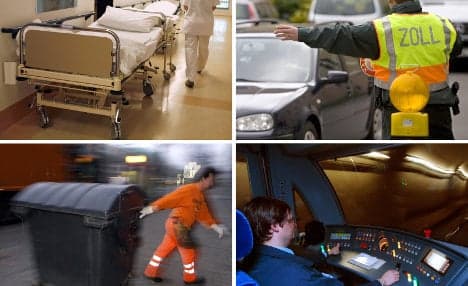Cities ask for help paying for new public workers' wage hike

German communities asked for financial support on Monday, saying they could not afford to back up their weekend agreement with public workers’ union Verdi to increase wages by 2.3 percent over the next two years.
“Our financial situation was catastrophic before the wage agreement. Now it’s even more difficult,” head of the German Association of Towns and Municipalities (DStGB) Gerd Landsberg told daily Handelsblatt.
“In plain words this means: the federal government must take on a significantly larger portion of housing costs for those on Hartz IV welfare benefits,” he said.
Landsberg also told the paper that the community finance commission meeting this Thursday would discuss business tax reforms in addition to how the federal, state and community responsibilities are divided.
One concrete change should be an assumption of rehabilitation costs for the disabled by the federal government, he suggested.
“That is no task for the communities,” he said, adding that it was a national responsibility that should be taken on by all tax payers because communities pay some €13.5 billion for such services each year and costs are still rising.
Despite their empty coffers, the states and cities agreed to give around two million government employees a pay raise, with improved conditions for older workers and trainees. A compromise was reached during wage negotiations in Potsdam on Saturday night after 14 hours of talks and the intervention of mediators.
President of the association of communal employers Thomas Böhle said the increase would cost local governments and their companies around €1.1 million this year, and a further €1.3 million next year.
Public workers' union Verdi’s chairman Frank Bsirske said the negotiations had been extremely difficult. He said the result was, “More than the employers’ attitude in the negotiations could lead one to expect, but it is less than many had hoped for, and what would have been necessary.”
Verdi had initially demanded a controversial five percent pay increase for its two million members, staging strikes across the country, affecting hospitals, child care centres, road maintenance, rubbish collection and public transportation. But states and cities said such a hefty raise was unrealistic following the worst recession since World War II last year.
Comments
See Also
“Our financial situation was catastrophic before the wage agreement. Now it’s even more difficult,” head of the German Association of Towns and Municipalities (DStGB) Gerd Landsberg told daily Handelsblatt.
“In plain words this means: the federal government must take on a significantly larger portion of housing costs for those on Hartz IV welfare benefits,” he said.
Landsberg also told the paper that the community finance commission meeting this Thursday would discuss business tax reforms in addition to how the federal, state and community responsibilities are divided.
One concrete change should be an assumption of rehabilitation costs for the disabled by the federal government, he suggested.
“That is no task for the communities,” he said, adding that it was a national responsibility that should be taken on by all tax payers because communities pay some €13.5 billion for such services each year and costs are still rising.
Despite their empty coffers, the states and cities agreed to give around two million government employees a pay raise, with improved conditions for older workers and trainees. A compromise was reached during wage negotiations in Potsdam on Saturday night after 14 hours of talks and the intervention of mediators.
President of the association of communal employers Thomas Böhle said the increase would cost local governments and their companies around €1.1 million this year, and a further €1.3 million next year.
Public workers' union Verdi’s chairman Frank Bsirske said the negotiations had been extremely difficult. He said the result was, “More than the employers’ attitude in the negotiations could lead one to expect, but it is less than many had hoped for, and what would have been necessary.”
Verdi had initially demanded a controversial five percent pay increase for its two million members, staging strikes across the country, affecting hospitals, child care centres, road maintenance, rubbish collection and public transportation. But states and cities said such a hefty raise was unrealistic following the worst recession since World War II last year.
Join the conversation in our comments section below. Share your own views and experience and if you have a question or suggestion for our journalists then email us at [email protected].
Please keep comments civil, constructive and on topic – and make sure to read our terms of use before getting involved.
Please log in here to leave a comment.